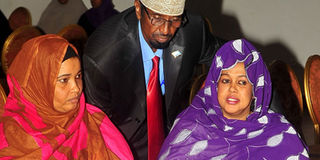Somalia turns to Diaspora for investment

Somali Ambassador to Uganda Ahmed Sayid Sheikh Dahir (C) talks to Somali business women during the Somalia Diaspora Forum at Imperial Royale Imperial Hotel in Kampala yesterday. Photo by Stephen Wandera
Kampala.
The Somali government has said it intends to tap into its Diaspora to invest in the war-ravaged country.
Speaking to the Somali Diaspora community in Kampala yesterday, Mr Abulkadir Kamtir, the director in the Office of Diaspora Affairs, said their investments will be protected.
He said he had spent more than 20 years in North America but got his property back after returning to the country.
“Our office thinks the Diaspora has the building capacity that Somalia needs. This is the first time we have reached out to this community and we are asking for their brains and the money to create jobs,” he said.
Hundreds of thousands of Somalis across the globe remit more than $1.5b (nearly Shs4 trillion) annually to their relatives.
Last year, the International Fund for Agricultural Development said it would provide $1.5 million (Shs4b)to fund Diaspora projects in Somalia.
More effort
Maj Gen Nathan Mugisha, the deputy Ugandan Ambassador to Somalia, said the security situation in the horn of Africa country had improved but more work was still needed.
Mr James Gadin, the political officer in Amisom, lauded Uganda for pioneering the effort to salvage the situation in Somalia but challenged the Diaspora to support the development of the capacity of their army.
“The Somali government cannot provide security and basic services. No one will build your army for you, we can only assist but the ultimate job must be done by you,” he said.
Mr Gadin also said the AU’s exit strategy in Somalia was dependant on how fast the army is built.
“Nobody will fold their arms and wait for al-Shabaab [militants] to rebuild and wreak havoc within and outside Somalia, especially after what they have done in Uganda and Kenya,” he said.
The Turkish Ambassdor to Uganda, Ms Ayse Sedef Yavuzalp said the Diaspora are educated and can be able to foster transparency.




